추천 제품
설명
surface tension 43 mN/m (1% aqueous)
Quality Level
형태
powder
불순물
5% moisture
손실
13.4 wt. % loss on heating, @ 316°C
3.3 wt. % loss on heating, @ 149°C
5.7 wt. % loss on heating, @ 204°C
8.5 wt. % loss on heating, @ 260°C
pH
6.5 (25 °C, 5%, aqueous solution)
전이 온도
sintering point 188 °C
solubility
NaOH: 0.05% (warm 5% aquesous)
MEK: partially soluble
benzene: insoluble
dioxane: soluble
ethylene glycol: soluble
hexane: insoluble
methanol: partially soluble
density
1.3 g/mL at 25 °C
벌크 밀도
23 lb/cu.ft (loose)
32 lb/cu.ft (packed)
유사한 제품을 찾으십니까? 방문 제품 비교 안내
일반 설명
Lignin, alkali is a complex, three dimensional polymer that is also known as kraft lignin that has undergone hydrolytic degradation. It is one of the major components of lignocellulosic materials. Lignin is a major product for second generation bioethanol production and is an impurity in the separation of cellulose from wood.
애플리케이션
Lignin, alkali can be used as a surface treatment agent for composites of natural fibers with petroleum based resins. It can be used as a biosorbent for potential applications in removing toxic metal ions from wastewater.
Storage Class Code
11 - Combustible Solids
WGK
WGK 3
Flash Point (°F)
Not applicable
Flash Point (°C)
Not applicable
개인 보호 장비
Eyeshields, Gloves, type N95 (US)
가장 최신 버전 중 하나를 선택하세요:
시험 성적서(COA)
Lot/Batch Number
Aiguo Wang et al.
Bioresource technology, 268, 505-513 (2018-08-17)
Maximizing the production of aromatic hydrocarbons from lignin conversion by coupling methane activation without solvent was investigated over Zn-Ga modified zeolite catalyst. The co-loading of Zn and Ga greatly improves lignin conversion, arene yield along with BTEX (i.e., benzene, toluene
Tanja Berger et al.
Folia microbiologica, 66(1), 87-98 (2020-09-26)
The potential of the culturable bacterial community from an Alpine coniferous forest site for the degradation of organic polymers and pollutants at low (5 °C) and moderate (20 °C) temperatures was evaluated. The majority of the 68 strains belonged to
Single, binary and multi-component adsorption of copper and cadmium from aqueous solutions on Kraft lignin?a biosorbent
Mohan D, et al.
Journal of Colloid and Interface Science, 297(2), 489-504 (2006)
Dong Tian et al.
Biotechnology for biofuels, 10, 157-157 (2017-06-27)
Current single-stage delignification-pretreatment technologies to overcome lignocellulosic biomass recalcitrance are usually achieved at the expense of compromising the recovery of the polysaccharide components, particularly the hemicellulose fraction. One way to enhance overall sugar recovery is to tailor an efficient two-stage
Adriana L Romero-Olivares et al.
PloS one, 12(6), e0179674-e0179674 (2017-06-18)
Over the long term, soil carbon (C) storage is partly determined by decomposition rate of carbon that is slow to decompose (i.e., recalcitrant C). According to thermodynamic theory, decomposition rates of recalcitrant C might differ from those of non-recalcitrant C
자사의 과학자팀은 생명 과학, 재료 과학, 화학 합성, 크로마토그래피, 분석 및 기타 많은 영역을 포함한 모든 과학 분야에 경험이 있습니다..
고객지원팀으로 연락바랍니다.







